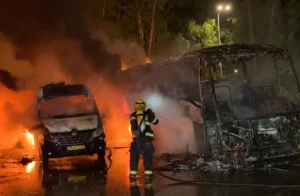11 suspects were arrested on suspicion of involvement in arson and aiding the other suspects

Israel Police arrested a group of Israeli Arabs from Tuba-Zangariyye on suspicion that they torched buses in Safed in June and were on their way to commit another act of arson on Friday, police announced on Sunday.
Three residents of Tuba-Zangariyye were stopped while driving near Amiad Junction on Friday evening. After searching their car, police found tools for arson, including flammable chemicals, prepared torches, lookout and burglary equipment, flashlights, fake license plates, gloves and a change of clothes.
After questioning the three, police raised a number of locations in Tuba-Zangariyye and Sakhnin on Sunday, arresting another eight suspects on suspicion of involvement in arson and aiding the other suspects.
The three suspects arrested on Friday are also suspected of committing a number of other arson crimes in northern Israel in the past month. Their arrests were extended until Tuesday.
Police believe the three were working for a criminal organization that was extorting “protection” payments from businesses in the north.
In mid-June, 18 buses were torched at the Central Bus Station in Safed in northern Israel. In the weeks preceding the arson, two private buses were torched in Safed and eight private buses were torched in Kiryat Shmona.
“We are working with all our might and with all the tools at our disposal against the phenomenon of collecting the ‘protection’ payments, from catching the perpetrators as in this case, to economic criminal operations against their senders – the heads of criminal organizations,” said Israel Police Northern District commander Shimon Lavi. “In parallel with the whole campaign that we are running in order to catch the criminals ‘in the act,’ we have raised the need to make a change in the legislation in order to allow us additional tools for action against the phenomenon of extortion of protection payments.”
